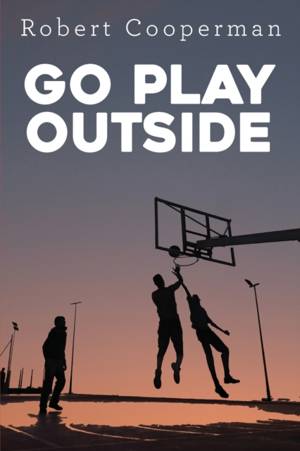
- Afhalen na 1 uur in een winkel met voorraad
- Gratis thuislevering in België vanaf € 30
- Ruim aanbod met 7 miljoen producten
- Afhalen na 1 uur in een winkel met voorraad
- Gratis thuislevering in België vanaf € 30
- Ruim aanbod met 7 miljoen producten
Zoeken
Omschrijving
In Go Play Outside, poet Robert Cooperman chronicles his first, unconditional love, basketball even if the affair has been unrequited, Cooper is far better at writing poetry than he ever was at hoops.
Cooperman begins with the origins of the game itself, from the legendary peach baskets of Dr. James Naismith, arising out of that brutal and boring winter of 1891, in Springfield, Massachusetts. From that origin point, progressing into the early professional game of the Twenties. Cooperman than takes us fast forward to his own discovery of the beauty of the game while watching early NBA contests. Evolving with his attempts at playing the game himself, on his own block, in schoolyards. Finally, trying out, unsuccessfully for his high school team. Thereafter, rejuvenated with his witness of the recently late, great Elgin Baylor, Cooperman's all-time sports idol, the player, he asserts, who changed the game from horizontal to vertical.
Along the way, we get pictures of what it is about the sport that he loves: its flow, its kinetic "music," its balletic grace and style, as when a perfectly attempted jump shot swishes through the bucket for a score. Maybe it's too much to assert that basketball is a metaphor for life, but without the game, Cooperman's life would have been far less rich. And like life, basketball requires hard work, dedication, practice, and maybe a little bit of genius, or at least moxie. All of which are on display in this lovely collection.
Cooperman begins with the origins of the game itself, from the legendary peach baskets of Dr. James Naismith, arising out of that brutal and boring winter of 1891, in Springfield, Massachusetts. From that origin point, progressing into the early professional game of the Twenties. Cooperman than takes us fast forward to his own discovery of the beauty of the game while watching early NBA contests. Evolving with his attempts at playing the game himself, on his own block, in schoolyards. Finally, trying out, unsuccessfully for his high school team. Thereafter, rejuvenated with his witness of the recently late, great Elgin Baylor, Cooperman's all-time sports idol, the player, he asserts, who changed the game from horizontal to vertical.
Along the way, we get pictures of what it is about the sport that he loves: its flow, its kinetic "music," its balletic grace and style, as when a perfectly attempted jump shot swishes through the bucket for a score. Maybe it's too much to assert that basketball is a metaphor for life, but without the game, Cooperman's life would have been far less rich. And like life, basketball requires hard work, dedication, practice, and maybe a little bit of genius, or at least moxie. All of which are on display in this lovely collection.
Specificaties
Betrokkenen
- Auteur(s):
- Uitgeverij:
Inhoud
- Aantal bladzijden:
- 106
- Taal:
- Engels
Eigenschappen
- Productcode (EAN):
- 9781627203784
- Verschijningsdatum:
- 1/02/2022
- Uitvoering:
- Paperback
- Formaat:
- Trade paperback (VS)
- Afmetingen:
- 152 mm x 229 mm
- Gewicht:
- 154 g

Alleen bij Standaard Boekhandel
+ 36 punten op je klantenkaart van Standaard Boekhandel
Beoordelingen
We publiceren alleen reviews die voldoen aan de voorwaarden voor reviews. Bekijk onze voorwaarden voor reviews.








